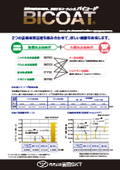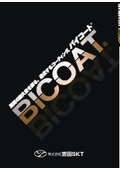What types of materials are used for molds? An introduction to surface treatments as well.
BICOAT
We will introduce the main materials used for molds, as well as surface treatments and case studies that can solve molding troubles.
There are various types of materials used for molds, but generally, the following are common: - Tool Steel: A type of steel that excels in wear resistance, heat resistance, and strength, used for the main parts of molds and cutting edges. - Cold Work Tool Steel: Known for its high hardness and dimensional stability, used for small parts of molds and complex-shaped components. - Hot Work Tool Steel: Maintains strength and dimensional stability even at high temperatures, used for large mold components and parts used under high temperatures. - Aluminum Alloy: A lightweight and highly workable material used for molds in low-pressure casting and high-pressure casting. - Copper Alloy: Possesses high electrical and thermal conductivity, used for molds in plastic injection molding and die casting. - Ceramics: A material that excels in heat resistance and wear resistance, used for molds that operate at high temperatures and for precision molding. As such, various materials are used for molds depending on their applications. Choosing the appropriate material is essential, but selecting the right surface treatment is also important for the mold's lifespan and product quality. Do you have any concerns regarding surface treatment for molds? <Molding Equipment> - Mold damage - Mold dimensional accuracy - Coating peeling
Inquire About This Product
Related Videos
basic information
Common surface treatments used for molds include: 1. Plating 2. Anodizing 3. Fluororesin coating 4. DLC coating However, conventional surface treatments may not fulfill all desired functions such as release properties and strength, and improvements may not be achieved as expected. Our original surface treatment, 'BICOAT', realizes a combination of "strength + anti-adhesion and slip properties comparable to fluororesin coating." [Main types of BICOAT(R)] ■ NYK-01 - Surface treatment combining a nickel-based metal coating with fluororesin. ■ NOO-01 - Surface treatment combining a chromium-based metal coating with fluororesin. ■ TYS-03 - Surface treatment that integrates fluororesin into a chemical conversion coating reacted with iron ions in the metal substrate. ■ NYN-11 - Surface treatment combining an alumina coating with fluororesin. ■ CTT-200 - Surface treatment combining a metal coating with siloxane-based resin. *For more details, please refer to the PDF document or feel free to contact us.
Price range
Delivery Time
Applications/Examples of results
【Applications】 ■ Injection molding molds for rubber ■ Molds requiring dimensional accuracy for release ■ Parts requiring wear resistance and slip ■ Parts requiring wear resistance and non-stick properties ■ Release of adhesives and sticky materials *For more details, please refer to the PDF document or feel free to contact us.
catalog(4)
Download All Catalogs
News about this product(1)
Company information
To maximize the performance of manufacturing equipment and machine parts, Yoshida SKT derives the "optimal solution" tailored to our customers from hundreds of surface treatment technologies. - Decreased productivity due to adhesive troubles - Instability in product quality due to friction - Early deterioration of equipment due to corrosion We respond to these challenges in the manufacturing field with our extensive track record and reliable technical expertise. In 1963, we began fluoropolymer processing. In 1968, we signed a licensing agreement with DuPont (now Chemours), supporting manufacturing innovations for over 2,000 customers across various industries, from automotive to medical and aerospace. Furthermore, in 2024, we are focusing on the development of next-generation products, such as PFAS-free coatings, contributing to the advancement of sustainable manufacturing. With a three-base system in Nagoya, Tokyo, and Yamaguchi, we flexibly respond to both mass production and custom orders. Our consistent quality management system ensures that we deliver reliable quality. For solving challenges in the manufacturing field, trust the surface treatment experts at Yoshida SKT.















